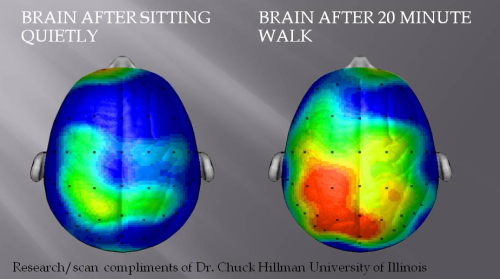
We have all undoubtedly heard that playing sports helps to avoid depression, memory loss, Alzheimer's disease, Parkinson's disease and many other troubles. But if you ask, how do exercises actually affect the brain? It turns out that not everyone knows the answer to this question. We will try to figure it out. We will also tell you how much you need to do sports to stay in a good mood all the time, and share secrets about how to make daily activities a pleasant habit.
It is clear what happens to our body if we exercise regularly. There will be more muscles, we will be more resilient. It will be easier to perform some everyday tasks, for example, climbing stairs. But when it comes to the brain and mood, the connection with exercise becomes less obvious. The phrase to which many are accustomed: "sport promotes the production of endorphins" — these are such beautiful words, few people will be able to explain exactly what processes are hidden behind them.
And what really happens is this.
When you start exercising, the brain perceives it as stress. As the pressure increases, the brain thinks that you are fighting the enemy or hiding from him. To protect yourself and the brain from stress, the body begins to produce the protein BDNF (brain neurotrophic factor). This protein has a protective effect, and also stimulates the development of neurons and acts as a reset button. That's why after training we usually feel lightness and clarity of thoughts, and ultimately happiness.
At the same time, endorphins are also involved in the fight against stress. Their main task is to minimize the discomfort of exercise, block the feeling of pain and even awaken a sense of euphoria.
In general, a lot of chemical processes occur in the brain after exercise, much more than if you just sit, even if you think hard.

BDNF protein and endorphins are the reason we feel great after exercising. A little scary is that their effect is very similar to how morphine, heroin or nicotine acts on the body. What's the difference? Exercises bring great benefits.
That's where the fun begins. We have understood the basics of the chemical processes that occur in the brain during exercise. Now the question is, what should be the training regime so that our mood is always on top?
A recent study by the University of Pennsylvania shed light on this question, the results were surprising. How productive and happy you feel on a given day is influenced not by how regularly you exercise, but by whether you did it on that day:
"Those who were engaged in sports the whole previous month, but did not exercise on the day of the study, showed better results in memory tests than those who lead an unsportsmanlike lifestyle. But the best results were from a group of people who did exercises in the morning on the day of testing."
Popular New York Times author Gretchen Reynolds has written an entire book called "The First 20 Minutes." To significantly improve your health and morale, you do not need to become a professional athlete. On the contrary, it takes very little time to reach the peak of happiness and productivity:
"The first 20 minutes of active movement provide the greatest health benefits if you have previously led a sedentary lifestyle. You prolong your life and reduce the risk of various diseases, and all this in 20 minutes of sports exercises."
So relax, you don't need to drive yourself to exhaustion by training in the gym. 20 minutes of exercises (but only exercises, you need to focus) and your mood will be on top for the whole day.
But of course it is easier to write: "Exercise every day!" than, in fact, to do it.
Charles Dahig, author of the bestseller "The Power of Habit: Why We Do What We Do in Life and Business" shares his tips on how to force yourself to practice daily and make this process exciting.
1. Put sportswear on your alarm clock or phone before you go to bed
It seems that the technique is too simple, but it is one of the most effective. Put the clothes in which you will do the exercises, and put an alarm clock or a phone under it. In the morning, it will be much easier to convince yourself that you need to work out.
2. Keep track of your progress
Our goal is to make daily exercise a pleasant habit. And one of the ways to achieve this goal is to encourage yourself with "rewards" that will remind you of how great you feel when you exercise. Try using the RunKeeper application, register with Fitocracy, or find some other similar service. The main thing is to mark your results REGULARLY, preferably at the same time.
3. Start very small
Start by doing a 5-minute exercise 3 times a week. That's not a lot, is it? It's easy, right? The task is so simple that anyone can handle it and gradually it will grow into a habit. No need to set frightening goals for yourself, start with very small and indecently easy to accomplish.
And more: the body gets used to the release of endorphins and it takes more and more exercise to achieve the same level of happiness that you felt at the beginning, doing much less. What's the plus? The fact is that if you haven't done sports before or haven't done enough, then starting to do it now, you will feel how your level of euphoria after even short classes will simply go off the scale. In this mood, you can move mountains. So there will be improvements in all areas of your life.
Good luck! Go in for sports!